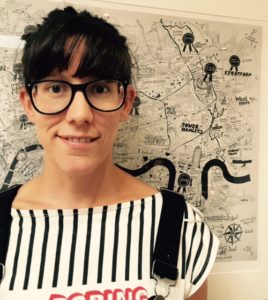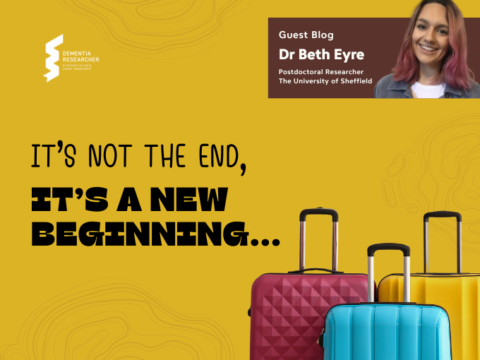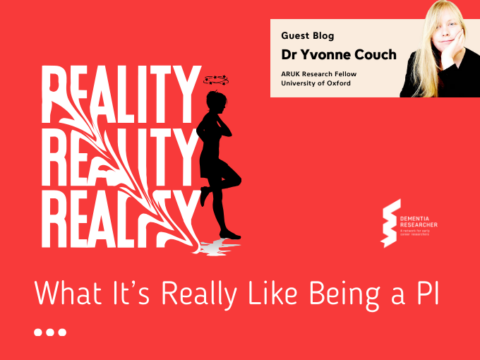 I am a speech and language therapist by training. I qualified in 2002 and have worked with adults with acquired neurological conditions since then. In this role, I have had to talk to a lot of different people, I have run a lot of different therapy groups, I have dealt with many tricky conflict situations (I worked in mental health and brain injury). But nothing filled me with more dread that the idea of being recorded and being played across the airways. And yet it is also one of the most exciting things I have had the opportunity to do.
I am a speech and language therapist by training. I qualified in 2002 and have worked with adults with acquired neurological conditions since then. In this role, I have had to talk to a lot of different people, I have run a lot of different therapy groups, I have dealt with many tricky conflict situations (I worked in mental health and brain injury). But nothing filled me with more dread that the idea of being recorded and being played across the airways. And yet it is also one of the most exciting things I have had the opportunity to do.
The problem is that I really dislike listening to myself. When I was an undergraduate student a taxi driver (outside of London) asked me if I was a cockney. He was serious. A few years later, a client with Parkinson’s disease advised me that I had a shrill and piercing voice. I wasn’t sure he was joking. Since then whenever I listen back to my voice this is exactly what I hear- a shrill, piercing and vaguely cockney voice. It makes me feel rather like I am not professional enough, like I don’t officially know what I am talking about.
A little while ago I stumbled across a tweet from @dementia_researcher inviting people to participate in a podcast on imposter syndrome. Given my concerns, this seemed absolutely perfect. I have always wanted to have a go at podcasting, and speaking on a subject not directly associated with my research project, but still about an area I feel passionately about (that speech and language therapists have all got a dose of totally unnecessary imposter syndrome, thus shooting themselves in the foot as they often don’t believe they can do research) I thought I should give it a go. Rather handily the recording studio that Dementia Researcher often use is centrally located at the UCL main campus, just by Euston. Thus, also solving my childcare juggling act- as I really didn’t have to go much out of my way to participate.
My first experience of podcasting was great fun. It turned out that the host that afternoon was a colleague of mine, Dr Chris Hardy, who was rather surprised to see me. Chris was surprised that I identified with imposter syndrome. He has seen me talk, and has spoken with me, and yet he had never noticed this. We had a really great discussion with two other researchers on what imposter syndrome means, and feels like. A few months later when the podcast aired I took the plunge and re-tweeted it. The reaction I got was quite fantastic. A number of fellow SLTs, both clinical and academic, as well as a number of student SLTs responded passionately to what I said.
 I was rather surprised by the number of people who actually listened to the podcast. Interestingly these were often different people to those who responded to tweets or blog posts, it seemed to reach a different audience. This made me consider whether this might be an interesting and different dissemination method for my project. Thus when Dementia Researcher tweeted asking for podcast ideas or topics it seemed like it could be an opportunity to talk about my PhD project. I tentatively put my idea forward, and was pleasantly surprised by the enthusiasm with which it was received. Adam Smith, who organised this podcast, and I had a telephone conversation about trying to invite more diverse researchers to speak on more diverse topics. And inviting clinical researchers was part of that aim. I suggested inviting an MSc student speech and language therapist (Olly Sawyer) who is working on the project with me gathering data, and one of the speech and language therapists consulting on the project (Rosemary Townsend, CEO at Dyscover). In the podcast, we spoke about the role of the speech and language therapist with people with language led dementia (primary progressive aphasia, PPA) and the intervention we have developed, and are now trialling in a randomised controlled pilot study across a number of NHS sites. It was even more nerve racking to speak on MY OWN WORK! And I confess I planned more of the answers this time, I really thought about and even scripted some of the possible things I might say. Yet in the end, it was a really natural conversation hosted by the wonderful Lakshini who was so interested in our work it just felt natural to simply chat about it.
I was rather surprised by the number of people who actually listened to the podcast. Interestingly these were often different people to those who responded to tweets or blog posts, it seemed to reach a different audience. This made me consider whether this might be an interesting and different dissemination method for my project. Thus when Dementia Researcher tweeted asking for podcast ideas or topics it seemed like it could be an opportunity to talk about my PhD project. I tentatively put my idea forward, and was pleasantly surprised by the enthusiasm with which it was received. Adam Smith, who organised this podcast, and I had a telephone conversation about trying to invite more diverse researchers to speak on more diverse topics. And inviting clinical researchers was part of that aim. I suggested inviting an MSc student speech and language therapist (Olly Sawyer) who is working on the project with me gathering data, and one of the speech and language therapists consulting on the project (Rosemary Townsend, CEO at Dyscover). In the podcast, we spoke about the role of the speech and language therapist with people with language led dementia (primary progressive aphasia, PPA) and the intervention we have developed, and are now trialling in a randomised controlled pilot study across a number of NHS sites. It was even more nerve racking to speak on MY OWN WORK! And I confess I planned more of the answers this time, I really thought about and even scripted some of the possible things I might say. Yet in the end, it was a really natural conversation hosted by the wonderful Lakshini who was so interested in our work it just felt natural to simply chat about it.
The response to this podcast blew me away. People retweeted it, the student SLTs were really excited about it. I received an email from Adam saying that it was one of the most listened to podcasts they had done so far! One of the most exciting emails I received was from the husband of a lady with PPA, who lived in New York. He has listened to the podcast and wondered if his wife could participate in the research. Unfortunately, they were a bit too far away, but I ended up corresponding with their speech and language therapist in New York (!) giving advice and making suggestions on therapy that might be helpful. Being able to help a person with PPA across the Atlantic felt like I was really making a difference.
Since then I have done one more podcast. This was another one that I suggested. And I suggested it to my head of department first. Professor Rosemary Varley and I had discussed the value of creative dissemination through avenues such as podcasting on previous occasions. No one in our department has really done much of this previously. So, having done a couple I suggested we could perhaps do one together, more broadly on language in dementia (an area where she also does research). Language can be a useful diagnostic tool, a cheap way of measuring change and an important area requiring therapy to enable people to maintain relationships and quality of life. Professor Varley, her post-doc linguist Dr Vitor Zimmerer, and I recently recorded this podcast together. It hasn’t been released quite yet, but I understand it will be part of a two part-podcast alongside another podcast that was made by two speech and language researchers working with people with dementia in Sydney, Australia. How exciting (Ed: this will be out on the 1st April – here on our website, also on SoundCloud, iTunes and Spotify.)
In conclusion and for anyone who is contemplating the experience of podcasting and hasn’t quite made up their mind, or built up the courage, I would encourage you to take the plunge. No-one likes the sound of their own voice. But once you get through this, you can reach a new and different audience, nationally and internationally.
If you would like to record a podcast on your work, or join one of our panels drop us a line.
Author
Anna Volkmer is a Speech and Language Therapist and NIHR Doctoral Research Fellow working in Language and Cognition, Department of Psychology and Language Sciences, University College London. Anna is researching Speech and language therapy interventions in language led dementia.
You can follow Anna on Twitter Follow @volkmer_anna

 Print This Post
Print This Post




